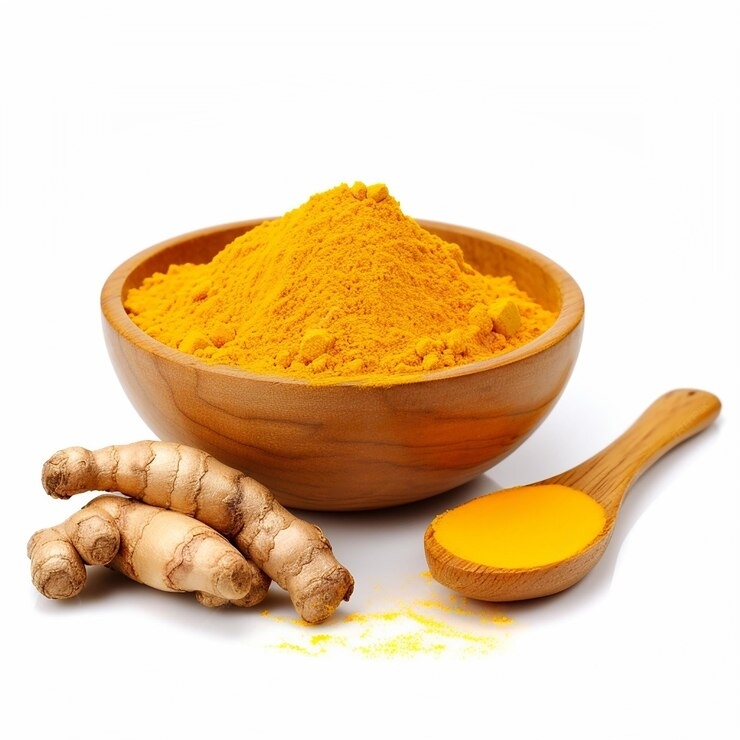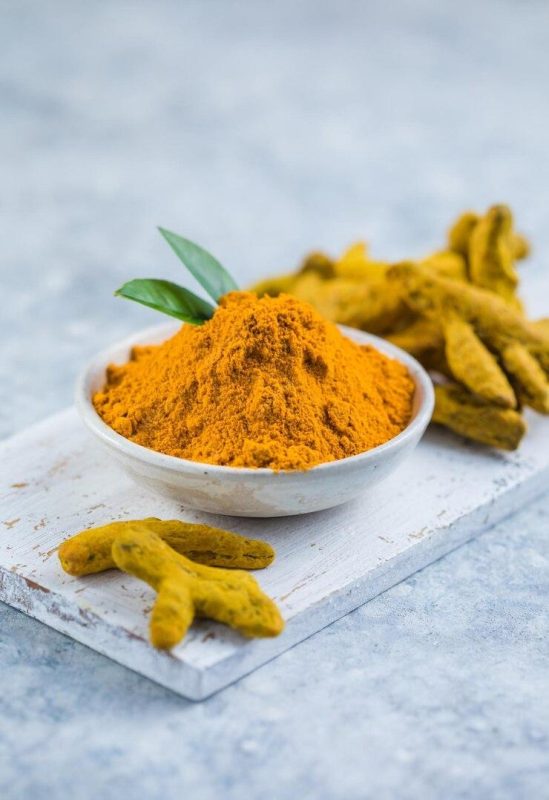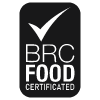This tropical plant with a yellow root is not only used as a famous spice, but also has countless health benefits. Turmeric is a flowering plant from the ginger family.
Turmeric powder is dark and sometimes bright yellow. The main habitat of this plant is India and it forms the main part of the famous curry spice.
This plant is one of the strongest antioxidants and reduces inflammation in the body, repairs the skin and improves cognitive senses (memory). Turmeric is rich in a chemical compound called curcumin. Improves insulin resistance in diabetic patients. Neutralizes excess insulin in the blood and prevents fatigue caused by low blood glucose and loss of appetite and weight.
Its dried and ground root is used alone or mixed with other spices in Iran, Pakistan and India. Turmeric is one of the main ingredients of spices as a flavoring.
Curcumin, a bright yellow chemical produced by the turmeric plant, is approved as a food additive by the World Health Organization, the European Parliament, and the US Food and Drug Administration.
According to research, turmeric has different compounds. The main active ingredient of turmeric is curcumin, which is responsible for the anti-inflammatory, anti-oxidant and antibacterial properties of turmeric.
Among its important compounds: valeric acid, flandrene, caprylic and sabi nil, bruneol and tourmerol
The best type of turmeric for

India : India is the largest producer and consumer of turmeric in the world and produces different types of this spice.
Sri Lanka : Sri Lankan turmeric is bright yellow in color and has a mild taste.
Iran: Iranian turmeric has a unique aroma and taste.
How to use
- As a spice in food
- as a supplement (tablets or capsules)
- as tea
Properties
- Treatment of digestive diseases
- Treatment of inflammatory diseases
- Preventing all types of cancers
- Preventing cardiovascular diseases
- Diabetes control
- For skin and hair
- Reduction of inflammatory diseases: rheumatoid arthritis, asthma, Alzheimer’s, optic neuritis and chronic bronchitis.
- Remove dark circles around the eyes
- Treatment of all types of pimples and acne
- hair loss prevention
- Reduction of skin wrinkles
- Prevent brain problems
- Fatty liver treatment
- Prevent aging
- depression treatment
- Treatment of kidney stones and gallstones
- stop bleeding
Complications
- Severe nausea
- Bleeding

- Low blood pressure
- Stomach problems and pains
- Fertility problems
- Severe and chronic headaches
- Increased blood sugar and diabetes
- Increased risk of bleeding
- Stomach problems and acid reflux disease
- Allergic reactions
- Iron deficiency
- Gallstones.
- Blood thinning
Interference with drugs
- Blood thinners: warfarin, aspirin, clopidogrel, Coumadin, etc.
- Stomach antacids: cimetidine (Tagamet), famotidine (Pepcid), ranitidine (Zantac), esomeprazole (Nexium), omeprazole (Prilosec), and lansoprazole (Pracid).
Properties of turmeric root
Turmeric root is the underground part of the turmeric plant, which is used in the preparation of its powder and extracts. This root has many medicinal and anti-inflammatory properties that are used. Its root is used in traditional medicine as an antiseptic and antibacterial.
Properties of turmeric wood
Turmeric wood is a part of the stem and branches of this plant, whose color is yellow to amber. Turmeric wood has antibacterial and antifungal properties. Used to maintain health and reduce the growth of microbes and fungi.
Nutritional value table
| Compounds of constituent | The amount of each in 100 grams of food |
| Energy | 354 kcal |
| carbohydrate | 64.93 grams |
| Protein | 7.83 grams |
| fat | 9.88 grams |
| Water | 11.36 grams |
| fiber | 21.10 grams |
| sugar Loaf | 3.21 grams |
| Cholesterol | 0.00 mg |
| Table of vitamins of turmeric powder | |
| Type of vitamin | The amount of each in 100 grams of food |
| Vitamin A | 0.00 µg |
| Vitamin D | 0.00 µg |
| Vitamin E | 3.10 mg |
| Vitamin K | 13.40 micrograms |
| Vitamin C | 25.90 mg |
| Thiamine (B1) | 0.15 mg |
| Riboflavin (B2) | 0.23 mg |
| Niacin (B3) | 5.14 mg |
| Choline (B4) | 49.20 mg |
| pantothenic acid (B5) | 0.00 mg |
| Vitamin B6 | 1.80 mg |
| Folate (B9) | 39.00 micrograms |
| Vitamin B12 | 0.00 mg |
| Table of minerals of turmeric powder | |
| Mineral type | The amount of each in 100 grams of food |
| Calcium | 183.00 mg |
| iron | 41.42 mg |
| magnesium | 193.00 mg |
| phosphorus | 268.00 mg |
| potassium | 2525.00 mg |
| sodium | 38.00 mg |
| Roy | 4.35 mg |
| copper | 0.60 mg |
| Manganese | 7.83 mg |
| selenium | 4.50 micrograms |
The products we offer are:
Instant Baking yeast : link
Demineral Permeate Powder : link
Tomato Powder : link
Dates Seeds Coffee : link









helloI really like your writing so a lot share we keep up a correspondence extra approximately your post on AOL I need an expert in this house to unravel my problem May be that is you Taking a look ahead to see you.
Temp mail Very well presented. Every quote was awesome and thanks for sharing the content. Keep sharing and keep motivating others.
I’m not sure where you’re getting your information, but good topic. I needs to spend some time learning more or understanding more. Thanks for wonderful information I was looking for this info for my mission.
Thanks for sharing. I read many of your blog posts, cool, your blog is very good.
Thanks for sharing. I read many of your blog posts, cool, your blog is very good.
Each post is a window into The thoughts, and I must say, the view is stunning.
I look forward to The posts because they always offer something valuable. Another great read!
Adding value to the conversation in a way that’s as engaging as a flirtatious wink. Can’t wait to hear more.
Fantastic job breaking down this topic, like a demolition crew for my misconceptions.
The knack for making hard to understand concepts readable is something I greatly admire.
The post resonated with me on many levels. Thank you for writing it!
The way you break down ideas is like a chef explaining a recipe, making hard to understand dishes seem simple.